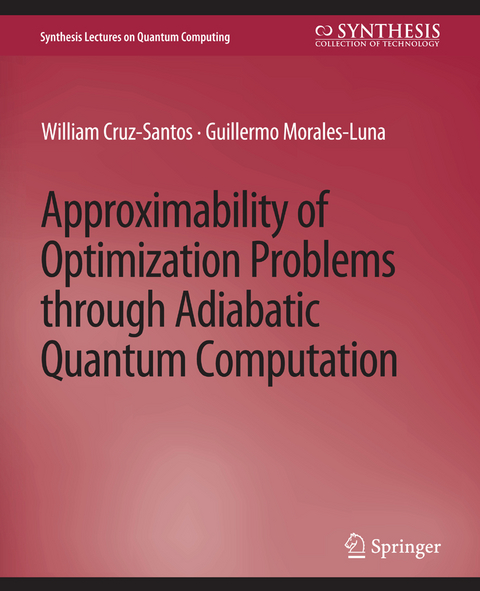
Approximability of Optimization Problems through Adiabatic Quantum Computation
Springer International Publishing (Verlag)
9783031013911 (ISBN)
William Cruz-Santos is a full-time professor of Mathematics and Computer Science at the Computer Engineering at the Universidad Autonoma del Estado de Mexico. Dr. Cruz-Santos' research interests include design of adiabatic quantum algorithms for solving NP-hard problems and simulation of quantum systems, as well as computational complexity analysis and algorithm design of classical algorithms. Dr. Cruz-Santos is particularly interested in the development of adiabatic quantum algorithms applied to computer vision problems from a combinatorial optimization point of view. Dr. Cruz-Santos holds a B.Sc. in Computer Science from the Universidad Juarez Autonoma de Tabasco, as well as M.Sc. and Ph.D. degrees in Computer Science, both degrees from the Centro de Investigacion y de Estudios Avanzados del IPN (Cinvestav-IPN). Guillermo Morales-Luna received the BSc degree in Mathematics from the Mexican National Polytechnic Institute in 1977, the MSc degree in Mathematics from Mexican Cinvestav-IPN, in 1978, and the PhD degree from the Mathematics Institute of the Polish Academy of Sciences in 1984. Since 1985 he is a researcher at Cinvestav-IPN. His research interests include cryptography, complexity theory, and mathematical logic. He is a Mexican national and he also holds Polish citizenship.
Preface.- Acknowledgments.- Introduction.- Approximability of NP-hard Problems.- Adiabatic Quantum Computing.- Efficient Hamiltonian Construction.- AQC for Pseudo-Boolean Optimization.- A General Strategy to Solve NP-Hard Problems.- Conclusions.- Bibliography.- Authors' Biographies.
| Erscheinungsdatum | 06.06.2022 |
|---|---|
| Reihe/Serie | Synthesis Lectures on Quantum Computing |
| Zusatzinfo | XV, 97 p. |
| Verlagsort | Cham |
| Sprache | englisch |
| Maße | 191 x 235 mm |
| Gewicht | 233 g |
| Themenwelt | Mathematik / Informatik ► Informatik ► Theorie / Studium |
| Mathematik / Informatik ► Mathematik | |
| Naturwissenschaften ► Physik / Astronomie ► Quantenphysik | |
| ISBN-13 | 9783031013911 / 9783031013911 |
| Zustand | Neuware |
| Informationen gemäß Produktsicherheitsverordnung (GPSR) | |
| Haben Sie eine Frage zum Produkt? |
aus dem Bereich


